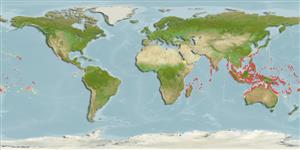Holothuroidea |
Holothuriida |
Holothuriidae
Environment: milieu / climate zone / depth range / distribution range
Ecology
Reef-associated; depth range 0 - 20 m (Ref. 800). Tropical
Indo-West Pacific, except the Hawaiian Islands.
Length at first maturity / Size / Weight / Age
Maturity: Lm ? range ? - ? cm Max length : 40.0 cm TL male/unsexed; (Ref. 118); max. published weight: 2.0 kg (Ref. 118)
Cuverian tubules are extruded almost immediately after disturbance (Ref. 800). It occurs in coarse coral sand, from the intertidal to a depth of 20 m (Ref. 800). It is a burrowing form and comes out of the mud during cloudy days and at night (Ref. 118) being a nocturnal species (Ref. 85218). Particularly prefers reef flats and seagrass beds (Ref. 85218). Small individuals are usually buried in the sand while larger specimens are covered with a thin layer of sand (Ref. 800).
Life cycle and mating behavior
Maturity | Reproduction | Spawning | Eggs | Fecundity | Larvae
Spawning observed in March and April (Ref. 800).
Fischer, W., I. Sousa, A. de Freitas, J.M. Poutiers, W. Schneider, T.C. Borges, J.P. Féral and A. Massinga 1990 Fichas FAO de identificação de espécies para actividades de pesca. Guía de campo das espécies comerciais marinhas e de águas salobras de Moçambique. FAO. Rome. 424 p. (Ref. 418)
IUCN Red List Status
(Ref. 130435: Version 2025-1)
CITES status (Ref. 108899)
Not Evaluated
Not Evaluated
Threat to humans
Harmless
Human uses
Fisheries: commercial
| FishSource | Sea Around Us
Tools
More information
Trophic EcologyFood items (preys)
Diet composition
Food consumption
Predators
Life cycleReproductionMaturityFecunditySpawningEggsEgg developmentLarvae PhysiologyOxygen consumption
Human RelatedStamps, coins, misc.
Internet sources
Estimates based on models
Preferred temperature
(Ref.
115969): 25.2 - 29.3, mean 28.5 (based on 2973 cells).
Fishing Vulnerability
Low to moderate vulnerability (30 of 100).
Price category
Unknown.
Nutrients : Calcium = 126 [75, 177] mg/100g; Iron = 4.79 [1.67, 7.92] mg/100g; Protein = 16.6 [15.4, 17.8] %; Omega3 = 0.331 [0.263, 0.400] g/100g; Selenium = 57.8 [48.5, 67.2] μg/100g; VitaminA = 0 μg/100g; Zinc = 1.97 [0.92, 3.02] mg/100g (wet weight); based on
nutrient studies.
